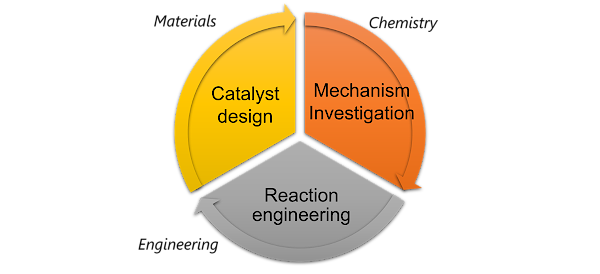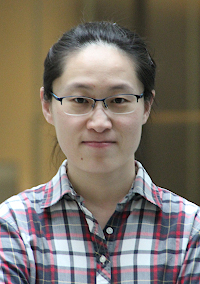Prof. Xue WANG
Prof. Xue Wang received her Ph.D. degree in Chemistry from Xiamen University in 2015 under the supervision of Prof. Zhaoxiong Xie and Prof. Younan Xia. During her graduate studies, she worked at the Georgia Institute of Technology as a visiting graduate student (2013-2015). After her Ph.D. graduation, she was appointed as associate professor at Lanzhou Institute of Chemical Physics, Chinese Academy of Sciences (2016-2017). Then she went to University of Toronto and worked as a postdoctoral fellow with Prof. Ted Sargent, prior to joining the City University of Hong Kong as an assistant professor in the School of Energy and Environment in January 2023. Prof. Wang’s research expertise covers nanomaterial design, electrocatalysis, and reaction engineering, with a particular emphasis on energy-related applications.
Research Interests
With increasing global energy usage, combined with intensifying anthropogenic climate change, the future energy system is required drastic modification: moving from fossil fuels to low-carbon energy sources. Although energy potential from solar and wind exceeds global energy consumption many times over, we are challenged to develop technologies for efficient conversion and storage of renewables.
Within this broad landscape, XUE WANG group’s research focuses on science and engineering for decarbonization of the energy sector using electrocatalysis approach. Through the combination of catalyst design, mechanism investigation, and reaction engineering, we aim to develop efficient CO2 electrochemical conversion technologies for renewable energy storage & conversion, electrosynthesis of chemicals/fuels, and climate change mitigation, as well as unravel the physical and chemical events at the molecular level during the electrocatalysis processes.

Position Available
Ph.D. Candidates:
Potential graduate students (including students who will receive/have received the bachelor degree or master degree) who are interested in the topics of electrocatalyst design, electrolysis technology are welcome to contact Prof. Wang at xue.wang@cityu.edu.hk with your CV, transcripts (UG/PG transcripts and English proficiency certificate), and publications (if applicable). The candidates with research experience in one or more areas of physical chemistry, electrocatalysis, and/or nanomaterials will be preferred. Please visit here for information on apply for graduate studies and postgraduate studentship at the City University of Hong Kong and refer to the English proficiency requirement by SEE (here). Applicants will have to go through a centralized admission process through the City University of Hong Kong with Prof. Wang’s recommendation. Outstanding candidates will also be recommended to apply to Hong Kong PhD Fellowship Scheme (HKPFS).
Postdoctoral Fellows:
- Duties
The appointee will conduct research in CO2 electrochemical conversion.
- Requirements
Candidates have background in electrocatalysis and/or CO2 The candidates should have at least 3 first-authored papers in high-impact SCI-indexed journals. Ph.D. degree or close to receiving Ph.D. degree is required for postdoctoral fellow. Successful candidates are expected to demonstrate strong motivation, critical thinking ability, as well as good oral and written communication skills in English.
- Salary and Conditions of Service
Salary offered will be highly competitive, commensurate with qualifications and experience. Fringe benefits include leave, medical, and dental consultations at the campus clinic.
- Application
To apply, please submit your CV including your full publications to Prof. Wang at xue.wang@cityu.edu.hk . Please also list 3 referees who are willing to supply letters of reference upon request.
Undergraduate Students:
We welcome highly motivated and enthusiastic undergraduate students to join our lab and participate in group research projects. Please email Prof. Wang at xue.wang@cityu.edu.hk for details.
City University of Hong Kong is an equal opportunity employer and we are committed to the principle of diversity. We encourage applications from all qualified candidates, especially applicants who will enhance the diversity of our staff.
Selected Publications
First, co-first#, corresponding*
- Wang, X.#; Li, P.#; Tam, J.; Howe, J. Y.; O’Brien, C. P.; Rasouli, A. S.; Miao, R. K.; Liu, Y.; Ozden, A.; Xie, K.; Wu, J.; Sinton D.; Sargent E. H.* Efficient CO and acrolein co-production via paired electrolysis. Nature Sustainability 2024, doi: 10.1038/s41893-024-01363-1
- Wu, Q.; Du, R.; Wang, P.; Waterhouse, G. I.N.*; Li, J.; Qiu, Y.; Yan, K.; Zhao, Y.; Zhao, W.-W.; Tsai, H.-J.; Chen, M.-C.; Hung, S.-F.*; Wang, X.*; Chen, G.* Nanograin boundary-abundant Cu2O-Cu nanocubes with high C2+ selectivity and good stability during electrochemical CO2 reduction at a current density of 500 mA cm−2. ACS Nano 2023, 17, 12884-12894.
- Du, R.#; Wu, Q.#; Zhang, S.#; Wang, P.; Li, Z.; Qiu, Y.; Yan, K.; Waterhouse, G. I.N.; Wang, P.; Zhao, Y.*; Zhao, W.-W.*; Wang, X.*; Chen, G.* Cu-C(O) interfaces deliver remarkable selectivity and stability for CO2 reduction to C2+ products at industrial current density of 500 mA cm−2. Small 2023, 2301289.
- Wang, X.#; Ou, P.#; Ozden, A.; Hung, S.-F.; Tam J.; Gabardo C. M.; Howe, J. Y.; Sisler J.; Bertens, K.; de Arquer, F. P. G.; Miao, R. K.; O’Brien, C. P.; Wang, Z.; Abed, J.; Rasouli, A. S.; Sun, M.; Ip, A. H.; Sinton, D.; Sargent, E. H.* Efficient electrosynthesis of n-propanol from carbon monoxide using a Ag–Ru–Cu catalyst. Nature Energy 2022, 7, 170-176.
- Hung, S.-F.#; Xu, A.#; Wang, X.#; Li, F.#; Hsu, S.-H.; Li, Y.; Wicks, J.; Cervantes, E. G.; Rasouli, A. S.; Li, Y. C.; Luo, M.; Nam, D.-H.; Wang, N.; Peng, T.; Yan, Y.; Lee, G.; Sargent, E. H.* A metal-supported single-atom catalytic site enables carbon dioxide hydrogenation. Nature Commun. 2022, 13, 819.
- Xie, Y.#; Ou, P.#; Wang, X.#; Xu, Z.; Li, Y. C.; Wang, Z.; Huang, J. E.; Wicks, J.; McCallum, C.; Wang, N.; Wang, Y.; Chen, T.; Lo, B. T. W.; Sinton, D.; Yu, J. C.; Wang Y.*; Sargent, E. H.* High carbon utilization in CO2 reduction to multi-carbon products in acidic media. Nature Catalysis 2022, doi:10.1038/s41929-022-00788-1
- Wang, X.#; Ou, P.#; Wicks, J.#; Xie, Y.#; Wang, Y.#; Li, J.; Tam J.; Ren, D.; Howe, J. Y.; Wang, Z.; Ozden, A.; Finfrock, Y. Z.; Xu, Y.; Li, Y.; Rasouli, A. S.; Bertens K.; Ip, A. H.; Graetzel, M.; Sinton D.; Sargent, E. H.* Gold-in-copper at low *CO coverage enables efficient electromethanation of CO2. Nature Commun. 2021, 12, 3387.
- Wang, X.#; Wang, Z.#; de Arquer, F. P. G.; Dinh, C. -T.; Ozden, A.; Li, Y. C.; Nam, D. -H.; Li, J.; Liu, Y. -S.; Wicks, J.; Chen, Z.; Chi, M.; Chen, B.; Wang, Y.; Tam, J.; Howe, J.; Proppe, A.; Todorovic, P.; Li, F.; Zhuang, T.; Gabardo, C. M.; Krimani, A.; McCallum, C.; Lum, Y.; Luo, M.; Min, Y.; Xu, A.; O’Brien, C. P.; Stephen, B.; Sun, B.; Ip, A. H.; Richter, L.; Kelley, S.; Sinton, D.; Sargent, E. H.* Efficient electrically powered CO2-to-ethanol via suppression of deoxygenation. Nature Energy 2020, 5, 478-486.
- Wang, X.#; Xu, A.#; Li, F.; Hung, S.-F.; Nam, D.-H.; Gabardo, C. M.; Wang, Z.; Xu, Y.; Ozden, A.; Rasouli, A. S.; Ip, A. H.; Sinton, D.; Sargent, E. H.* Efficient methane electrosynthesis enabled by tuning local CO2 availability. J. Am. Chem. Soc. 2020, 142, 3525-3531.
- Rasouli, A. S.#; Wang, X.#; Wicks, J.; Lee, G.; Peng, T.; Li, F.; McCallum, C.; Dinh, C.-T.; Ip, A. H.; Sinton, D.; Sargent, E. H.* CO2 electroreduction to methane at production rates exceeding 100 mA/cm2. ACS Sustainable Chem. Eng. 2020, 8, 14668-14673.
- Wang, X.*; Zhao, Z.; Sun, P.; Li, F.* One-step synthesis of supported high-index faceted platinum–cobalt nanocatalysts for an enhanced oxygen reduction reaction. ACS Appl. Energy Mater. 2020, 3, 5077-5082.
- Wang, X.#; Wang, Z.#; Zhuang, T.-T.; Dinh, C.-T.; Li, J.; Nam, D.-H.; Li, F.; Huang, C.-W.; Tan, C.-S.; Chen, Z.; Chi, M.; Gabardo, C. M.; Seifitokaldani, A.; Todorović, P.; Proppe, A.; Pang, Y.; Kirmani, A. R.; Wang, Y.; Ip, A. H.; Richter, L. J.; Scheffel, B.; Xu, A.; Lo, S.-C.; Kelley, S. O.; Sinton, D.; Sargent, E. H.* Efficient upgrading of CO to C3 fuel using asymmetric C-C coupling active sites. Nature Commun. 2019, 10, 5186.
- Zhao, M.#; Wang, X.#; Yang, X.#; Gilroy, K. D.; Qin, D.; Xia, Y.* Hollow metal nanocrystals with ultrathin, porous walls and well-controlled surface structures. Adv. Mater. 2018, 1801956.
- Zhao, Z.; Wang, X.*; Si, J.; Yue, C.; Xia, C.; Li, F.* Truncated concave octahedral Cu2O nanocrystals with {hkk} high-index facets for enhanced activity and stability in heterogeneous catalytic azide-alkyne cycloaddition. Green Chem. 2018, 20, 832-837.
- Wang, X.*#; Chen, J.#; Zeng, J.; Wang, Q.; Li, Z.; Qin, R.; Wu, C.; Xie, Z.*; Zheng, L. The synergy between atomically dispersed Pd and cerium oxide for enhanced catalytic properties. Nanoscale 2017, 9, 6643-6648.
- Vara, M.#; Roling, L. T.#; Wang, X.#; Elnabawy, A. O.; Hood, Z. D.; Chi. M.; Mavrikakis. M.; Xia, Y.* Understanding the thermal stability of palladium–platinum core–shell nanocrystals by in situ transmission electron microscopy and density functional theory. ACS Nano 2017, 11, 4571-4581.
- Wang, X.; Figueroa-Cosme, L.; Yang, X.; Luo, M.; Liu, J.; Xie, Z.; Xia, Y.* Pt-based icosahedral nanocages: using a combination of {111} facets, twin defects, and ultrathin walls to greatly enhance their activity toward oxygen reduction. Nano Lett. 2016, 16, 1467-1471.
- Wang, X.; Luo, M.; Huang, H.; Chi, M.; Howe, J.; Xie, Z.; Xia, Y.* Facile synthesis of Pt–Pd alloy nanocages and Pt nanorings by templating with Pd nanoplates. ChemNanoMat 2016, 2, 1086-1091.
- Wang, X.; Ruditskiy, A.; Xia, Y.* Rational design and synthesis of noble-metal nanoframes for catalytic and photonic applications. Natl. Sci. Rev. 2016, 3, 520-533.
- Wang, X.; Vara, M.; Luo, M.; Huang, H.; Ruditskiy, A.; Park, J.; Bao, S.; Liu, J.; Howe, J.; Chi, M.; Xie ; Xia, Y.* Pd@Pt core-shell concave decahedra: A class of catalysts for the oxygen reduction reaction with enhanced activity and durability. J. Am. Chem. Soc. 2015, 137, 15036-15042.
- Wang, X.#; Choi, S.-I.#; Roling, L. T.; Luo, M.; Ma, C.; Zhang, L.; Chi, M.; Liu, J.; Xie, Z.; Herron, J. A.; Mavrikakis, M.*; Xia, Y.* Palladium-platinum core-shell icosahedra with substantially enhanced activity and durability toward oxygen reduction. Nature Commun. 2015, 6, 7594.
- Wang, X.; Liu, C.; Zheng, B.; Jiang, Y.; Zhang, L.; Xie, Z.*; Zheng, L. Controlled synthesis of concave Cu2O microcrystals enclosed by {hhl} high-index facets and enhanced catalytic activity. J. Mater. Chem. A 2013, 1, 282-287.
- Wang, X.; Han, X.; Xie, S.; Kuang, Q.*; Jiang, Y.; Zhang, S.; Mu, X.; Chen, G.; Xie, Z.*; Zheng, L. Controlled synthesis and enhanced catalytic and gas-sensing properties of tin dioxide nanoparticles with exposed high-energy facets. Chem. Eur. J. 2012, 18, 2283-2289.
- Wang, X.; Jiang, Z.*; Zheng, B.; Xie, Z.*; Zheng, L. Synthesis and shape-dependent catalytic properties of CeO2 nanocubes and truncated octahedra. CrystEngComm 2012, 14, 7579-7582.

| Office: | YEUNG-B5424 |
|---|---|
| Phone: | +(852)-3442-6885 |
| Fax: | +(852)-3442-0688 |
| Email: | xue.wang@cityu.edu.hk |
| Google Scholar: | Link |
| Lab Website: | https://www.xuewang-research.com/ |
- Electrocatalysis
- Nanomaterials
- CO2 Electroreduction
- Chemicals/Fuels Electrosynthesis
- Energy Storage and Conversion
- Reaction Engineering